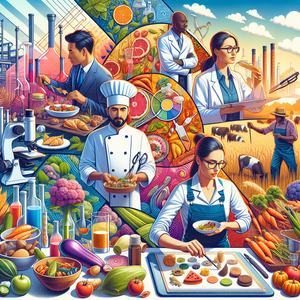
Exploring Career Pathways in the Food Industry: From Culinary Arts to Food Science and Beyond
The food industry is an exciting and multifaceted field filled with a wealth of career opportunities suited to a variety of interests and skills. Whether you’re drawn to the artistry of culinary creation, the scientific aspects of food production, or the principles of nutrition and safety, there’s a space for you. As the industry continues to adapt, professionals are increasingly focusing on areas like sustainability, nutrition education, and food technology. This article offers a comprehensive overview of various roles within the food sector, highlighting educational requirements, salary expectations, and emerging trends in the job market.
Job Summaries:
Food Scientist:
- Innovate and enhance food products while ensuring their safety and nutritional value.
- A degree in food science or a related field is typically necessary.
- Strong analytical and problem-solving skills are essential.
- With growing consumer emphasis on health and safety, the demand for food scientists is on the rise.
Culinary Chef:
- Design and prepare dishes, influencing culinary trends.
- A culinary degree or significant hands-on experience is often required.
- Leadership and organizational skills are key.
- Competitive salaries are common, particularly in high-end dining establishments.
Nutritionist:
- Offer dietary advice to enhance health and well-being.
- A degree in nutrition or dietetics, often accompanied by registered dietitian certification, is necessary.
- Nutritionists play a vital role in addressing health issues linked to diet.
Food Safety Inspector:
- Ensure compliance with health regulations in food establishments.
- A background in food science or agriculture is advantageous.
- They are crucial for maintaining public health and consumer trust.
Culinary Writer:
- Create content that educates and inspires food enthusiasts.
- Proficiency in writing and photography, alongside a keen awareness of food trends is essential.
- They shape discussions around food culture and practices.
Recipe Developer:
- Innovate and perfect recipes for restaurants and food brands.
- A solid culinary background complemented by creativity is required.
- They drive innovation within the food landscape.
Food Technologist:
- Focus on developing food products and improving processes.
- A degree in food technology or a related field is required.
- They enhance food quality and promote sustainability.
Restaurant Manager:
- Oversee the daily operations of a restaurant.
- A background in hospitality management or business is beneficial.
- Managers significantly influence the dining experience and local economy.
Food Marketer:
- Create strategies to effectively promote food products.
- Strong analytical and communication skills are necessary.
- They bridge the gap between food products and consumers.
Agricultural Scientist:
- Research methods to advance food production and sustainability.
- Typically requires a degree in agricultural science.
- Their work directly addresses global food security challenges.
Beverage Director:
- Curate beverage menus in restaurants or bars.
- Extensive knowledge of beverages and service techniques is essential.
- They enhance the overall dining experience.
Food Advocate:
- Promote policies for food security and sustainability.
- Expertise in public policy or nutrition is often beneficial.
- Advocates influence positive changes in food systems.
Butcher:
- Prepare and sell meat products.
- Training through apprenticeships or culinary schools is beneficial.
- They are vital to the food supply chain.
Pastry Chef:
- Specialize in crafting desserts and baked goods.
- A strong grasp of baking techniques and creativity is essential.
- They add artistic flair to culinary creations.
Food Photographer:
- Capture enticing images of food for marketing.
- An eye for aesthetics and knowledge of food styling is necessary.
- Their work enhances consumer engagement.
Community Educator:
- Teach the public about nutrition and healthy eating habits.
- Expertise in education or nutrition is advantageous.
- They promote health and wellness in communities.
Food Policy Analyst:
- Research and evaluate food-related policies.
- A degree in public policy or economics is typically required.
- They tackle critical issues such as food security.
Food Service Worker:
- Assist with various tasks in food establishments.
- Usually, no formal education is required, but training can be beneficial.
- They ensure efficient operations in the food service sector.
Food Blogger:
- Create engaging content about food and recipes.
- Writing and photography skills, alongside a passion for food, are essential.
- Bloggers influence food trends and consumer preferences.
Quality Assurance Specialist:
- Ensure food products meet safety and quality standards.
- A background in food science or quality management is essential.
- They help maintain consumer trust in food products.
The food industry presents a rich array of career options, each playing a vital role in shaping the culinary landscape and promoting public health. Whether your passion lies in the creative aspects of cooking, the scientific examination of food, or the societal impact of nutrition, there are numerous avenues to pursue. As you embark on your journey in this dynamic sector, take the time to research specific roles, required qualifications, and the trends that will shape your career path. Embrace the opportunity to influence the future of food through your chosen profession.
Explore More Jobs

